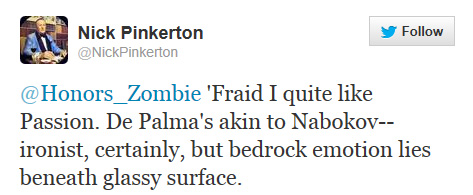
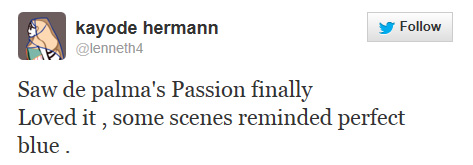
 Hello and welcome to the unofficial Brian De Palma website. Here is the latest news: |
|---|
E-mail
Geoffsongs@aol.com
-------------
Recent Headlines
a la Mod:
Listen to
Donaggio's full score
for Domino online
De Palma/Lehman
rapport at work
in Snakes
De Palma/Lehman
next novel is Terry
De Palma developing
Catch And Kill,
"a horror movie
based on real things
that have happened
in the news"
Supercut video
of De Palma's films
edited by Carl Rodrigue
Washington Post
review of Keesey book
-------------
Exclusive Passion
Interviews:
Brian De Palma
Karoline Herfurth
Leila Rozario
------------
------------
| « | June 2013 | » | ||||
| S | M | T | W | T | F | S |
| 1 | ||||||
| 2 | 3 | 4 | 5 | 6 | 7 | 8 |
| 9 | 10 | 11 | 12 | 13 | 14 | 15 |
| 16 | 17 | 18 | 19 | 20 | 21 | 22 |
| 23 | 24 | 25 | 26 | 27 | 28 | 29 |
| 30 | ||||||
De Palma interviewed
in Paris 2002
De Palma discusses
The Black Dahlia 2006

Enthusiasms...
Alfred Hitchcock
The Master Of Suspense
Sergio Leone
and the Infield
Fly Rule
The Filmmaker Who
Came In From The Cold
Jim Emerson on
Greetings & Hi, Mom!
Scarface: Make Way
For The Bad Guy
Deborah Shelton
Official Web Site
Welcome to the
Offices of Death Records

Meanwhile, Cape Cod Times' Tim Miller caught Wednesday night's screening of Passion at the festival. "The film is convoluted," states Miller, "where you often don't know whether you're watching a dream or reality, which is fine, but here it seems more than a little forced. No one ever accused De Palma of being subtle. But that can be a good thing, too: You can't stop watching Passion, wondering what bizarre thing will happen next."

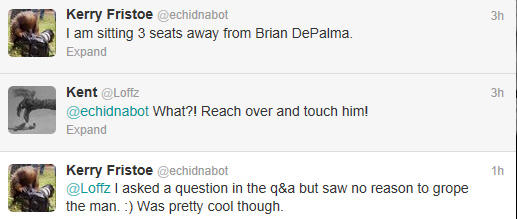
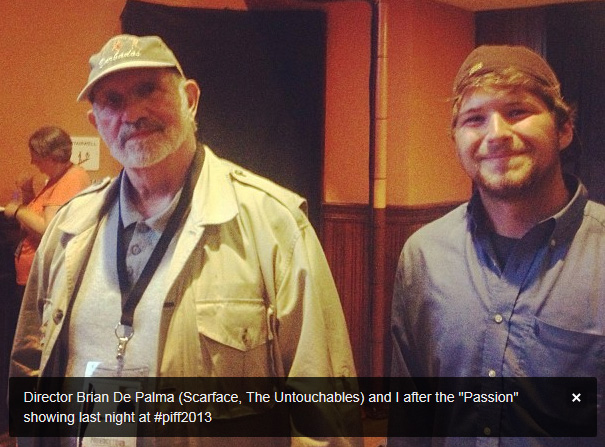
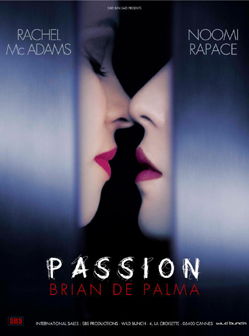 The Hollywood Reporter's David Rooney reported late last night that Brian De Palma will be a surprise guest at Saturday night's screening of Passion at the Provincetown International Film Festival. Rooney is reporting this as the U.S. premiere of the film, because the big New York Film Festival screening last year was canceled after an embarrassing glitch left De Palma and a packed house waiting for a film that was never to start. The film did screen at the festival two more times after that, but in smaller theaters. It also played at Provincetown this past Wednesday, the first night of the film fest. What characterizes the screening this Saturday as the U.S. premiere, then, is the fact that De Palma will be there to participate in an audience Q&A following the screening, in a more properly planned evening event (and a nice last-minute surprise for the audience).
The Hollywood Reporter's David Rooney reported late last night that Brian De Palma will be a surprise guest at Saturday night's screening of Passion at the Provincetown International Film Festival. Rooney is reporting this as the U.S. premiere of the film, because the big New York Film Festival screening last year was canceled after an embarrassing glitch left De Palma and a packed house waiting for a film that was never to start. The film did screen at the festival two more times after that, but in smaller theaters. It also played at Provincetown this past Wednesday, the first night of the film fest. What characterizes the screening this Saturday as the U.S. premiere, then, is the fact that De Palma will be there to participate in an audience Q&A following the screening, in a more properly planned evening event (and a nice last-minute surprise for the audience).
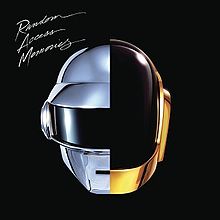 NPR's All Songs Considered this week featured Sami Yenigun asking Daft Punk's Thomas Bangalter and Guy-Manuel de Homem-Christo to talk about the songs that inspired their new album, Random Access Memories (the linked page above includes an audio version, so you can hear the duo talking about these songs). Midway through the program, Yenigun says, "You mentioned Paul Williams as one of the guests you had on the record. Can we hear some of his music?"
NPR's All Songs Considered this week featured Sami Yenigun asking Daft Punk's Thomas Bangalter and Guy-Manuel de Homem-Christo to talk about the songs that inspired their new album, Random Access Memories (the linked page above includes an audio version, so you can hear the duo talking about these songs). Midway through the program, Yenigun says, "You mentioned Paul Williams as one of the guests you had on the record. Can we hear some of his music?"On the audio version of the program, they then play a portion of "The Hell Of It" from the Phantom Of The Paradise soundtrack.
The Guardian's Dorian Lynskey interviewed the duo prior to the release of Random Access Memories. Lynskey wrote, "Their first loves were Jimi Hendrix, the Velvet Underground and Phantom of the Paradise, the bizarre 1974 musical horror movie that Brian De Palma made with Paul Williams. 'It covered everything we liked when we were teenagers: horror, rock, musicals, glam,' says Thomas, glowing with fandom. 'Listening to Led Zeppelin songs backwards, watching Texas Chainsaw Massacre on VHS and getting KISS and David Bowie albums. It synthesised all of these elements.'"
"EASY TO SEE WHY 'PHANTOM' WAS CATNIP FOR DAFT PUNK"
In a review of the album, Slate's Geeta Dayal delved into the Paul Williams collaboration "Touch," and its relationship to Phantom Of The Paradise:
Phantom of the Paradise is key to understanding Daft Punk’s aesthetic. In the movie, a nerdy songwriter is reborn as a phantom who attempts to exact revenge on an evil svengali record producer named Swan. In one scene in the movie, Swan traps the phantom—now wearing a tight black leather jacket and a robot helmet—in a sophisticated recording studio walled with racks of analog gear. The phantom, whose vocal cords have been destroyed, speaks through a talk box attached to his chest, sounding remarkably like a vocodered lyric in a Daft Punk song.
It’s easy to see why the rock opera was catnip for Daft Punk, who claim to have watched it more than 20 times—the movie is completely over-the-top, drenched in pathos, and layered with in-jokes and sideways references, much like the band’s music. Daft Punk’s black leather outfits in their 2006 feature film, Electroma, seemed inspired by the phantom. “Electroma is a combination of all the movies we like, paying a big, almost unconscious homage to them,” de Homem-Christo told Stop Smiling in 2008. “There are so many different influences: In the end, it becomes such a melting pot of everything that it resembles something else altogether. We love cinema the same way we do music—we’re from a generation that doesn’t segregate.”
“Touch” is the apex of Random Access Memories, the total realization of the album’s ambitious reach. There’s nothing cool about it, and it takes guts to make music like this in 2013 on such a grand scale. It’s Daft Punk’s love letter to Phantom of the Paradise, and it’s schmaltzy and deeply weird. The lyrics are, well, daft (“Touch, sweet touch/ You’ve given me too much to feel”), but the lyrics are beside the point; Williams’ graceful vocal delivery is awe-inspiring. It’s simultaneously melancholy and uplifting; the moment where Williams’ voice trails off and “Get Lucky” begins is a great moment in pop music.
The one thing she didn’t want to do with the show that became Peaches Does Herself was create a jukebox musical. Peaches hates jukebox musicals.
“They never have anything to do with the band they’re about,” she says, and “also, the asinine dialogue – that’s horrible, I don’t relate.” She gestures to the rest of her crew surrounding her in the diner booth. “That’s the reason why people like us don’t like [those] musicals – it’s never the original artist.
“That’s why I loved Tommy so much as a child,” she says, talking about the Ken Russell movie of the Who’s rock opera. “They’re all in it, and there’s no talking. The entire Acid Queen scene is, like, ingrained in my brain for life. And I also saw Phantom Of The Paradise – the music isn’t actually so great in that, but Brian de Palma did an insane, amazing job. And then Rocky Horror, which has amazing music, amazing production, [an] amazing theme – that’s my holy trilogy, right there.”
But there’s more going on in Peaches Does Herself, thanks to a lifetime of pop culture rattling around in its creator’s brain.
“My mother was really interested in the Busby Berkeley movies and Singin’ In The Rain,” she says, “and all that stuff. I got to pay homage to all those things that I loved, all those other musicals. And we decided to film it.”
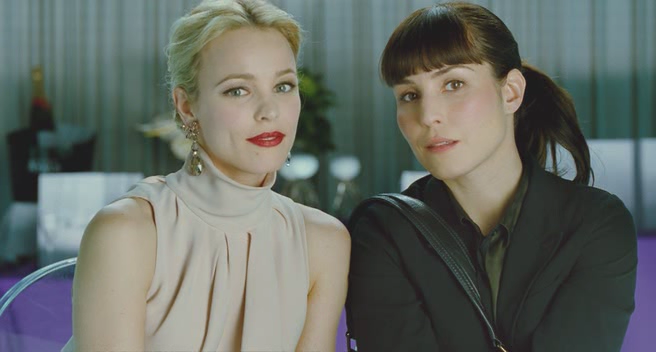
In writing about the festival, Edge on the Net's Jake Mulligan states, "There’s no film festival like Provincetown. While other festivals focus on independent films, or genre films, or foreign cinema; The Provincetown International Film Festival casts a wider net. They program their festival based not on arbitrary specifications but based on a mood; each film achieving some semblance of the fierce authorial vision that defines the festival itself."
Mulligan picks ten movies to see at the fest, including Passion, which he says is De Palma's best in more than ten years. "Brian De Palma’s latest film doesn’t open until August," writes Mulligan, "but fans of the Hitchcockian auteur will surely flock to P-Town to see his latest, Passion - it’s his best picture in over ten years. Not since Femme Fatale has the Carrie auteur had this much fun; setting up Rachel McAdams and Noomi Rapace here as two flirty PR executives engaged in a Parisian battle-of-wits. It’s De Palma, so the sexual tension quickly amplifies into actual sex, and then violence, and then total madness. But the real beauty is in the compositions, in the return of his trademark split-screen, and in his completely visual style of storytelling. Passion doesn’t just show that De Palma is back, it shows that he never went anywhere in the first place."
(Thanks to Patrick for the Passion pic!)
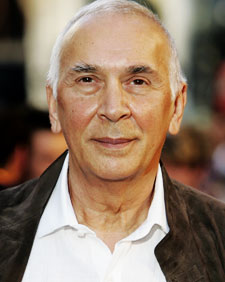 Ed Pressman recently sat down with Huffington Post's Rob Taub to discuss Happy Valley, the Joe Paterno film he is producing for Brian De Palma to direct, with Al Pacino starring. Taub's article originally stated that Frank Langella will portray Jerry Sandusky, who will be a major part of the film. However, by the next day (June 19, 2013), the article had been revised and Langella's name had been removed. A source says that Langella is one of several actors currently under consideration for the part of Sandusky. In any case, Taub writes that Pressman "is a bit cagey" on what exactly the film will cover. "People know the horror of Sandusky's acts," writes Taub, "and are aware of Paterno's complicity, but based on my conversation with Pressman, this film will give audiences a clear understanding of Sandusky's rise to power in the Penn State program and exactly how it brought about Paterno's demise." Pressman is quoted as saying, "It's a complex story." Taub adds that David McKenna has completed a treatment for the film. Here is an excerpt from Taub's article that includes a Paterno anecdote uncovered by McKenna, as well as a quote from Pressman about De Palma:
Ed Pressman recently sat down with Huffington Post's Rob Taub to discuss Happy Valley, the Joe Paterno film he is producing for Brian De Palma to direct, with Al Pacino starring. Taub's article originally stated that Frank Langella will portray Jerry Sandusky, who will be a major part of the film. However, by the next day (June 19, 2013), the article had been revised and Langella's name had been removed. A source says that Langella is one of several actors currently under consideration for the part of Sandusky. In any case, Taub writes that Pressman "is a bit cagey" on what exactly the film will cover. "People know the horror of Sandusky's acts," writes Taub, "and are aware of Paterno's complicity, but based on my conversation with Pressman, this film will give audiences a clear understanding of Sandusky's rise to power in the Penn State program and exactly how it brought about Paterno's demise." Pressman is quoted as saying, "It's a complex story." Taub adds that David McKenna has completed a treatment for the film. Here is an excerpt from Taub's article that includes a Paterno anecdote uncovered by McKenna, as well as a quote from Pressman about De Palma:College coaches -- even the good ones -- have the power of third world despots and come to enjoy the authority and control provided by their positions. Pressman certainly understands this and describes Paterno's story as a "Greek tragedy." His past experience in handling films with scandalous characters has worked out well, as he proved with Reversal of Fortune, where they told Claus Von Bulow's story from the perspective of the victim -- his wife, Sunny. According to Pressman, the Paterno story poses similar challenges, but nothing they can't handle. "It's been many years since I've seen Brian (De Palma) so excited," said Pressman.
Meanwhile, Hollywood Outbreak's Greg Srisavasdi, in posting about the upcoming release of De Palma's Passion, added a SoundCloud clip from a radio interview De Palma did at a press junket for Femme Fatale. In the clip, De Palma says: "Well, I'm very influenced by music, so I tend not to listen to it very much at all. Because it too emotionally kind of grabs me. And when I make movies I have to, you know, listen to a lot of orchestral music to figure out what... the composer should write. So I tend to keep away from listening to music. You know, I live in an apartment that has literally nothing much on the walls. I can't be... I'm best in some kind of motel room with nothing around me, because those kinds of things influence what's going on in my head. So I don't tend to expose myself to stimulus like that."